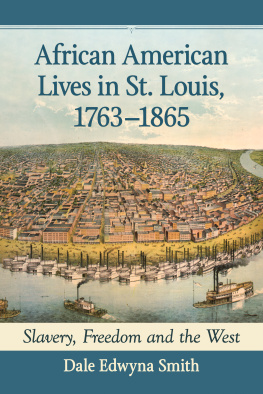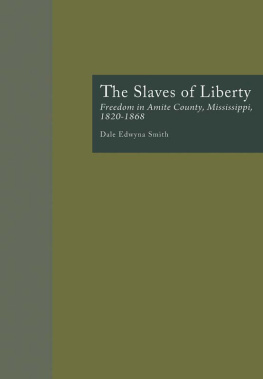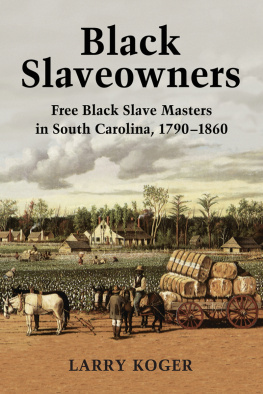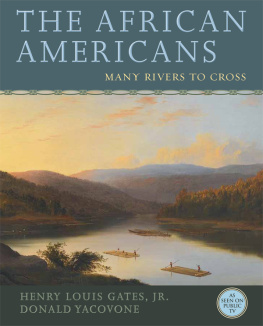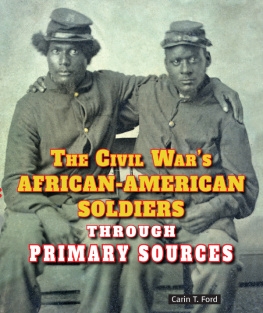
African American Lives in St. Louis, 17631865
Slavery, Freedom and the West
Dale Edwyna Smith

McFarland & Company, Inc., Publishers
Jefferson, North Carolina
All images are from the Missouri History Museum, St. Louis.
LIBRARY OF CONGRESS CATALOGUING DATA ARE AVAILABLE
BRITISH LIBRARY CATALOGUING DATA ARE AVAILABLE
e-ISBN: 978-1-4766-2757-1
2017 Dale Edwyna Smith. All rights reserved
No part of this book may be reproduced or transmitted in any form or by any means, electronic or mechanical, including photocopying or recording, or by any information storage and retrieval system, without permission in writing from the publisher.
Front cover image: Our City (St. Louis, Missouri) / lithograph by A. Janicke & Co., St. Louis, published by Hagen & Pfau at the Anzeiger des Westens, 1859 (Library of Congress)
McFarland & Company, Inc., Publishers
Box 611, Jefferson, North Carolina 28640
www.mcfarlandpub.com
For my parents,
Joyce Ella and James Irving Smith, Jr.,
and
in memory of
Seitu James Irving Smith, III,
my beloved brother,
19522014
Acknowledgments
The study of history requires access to a wealth of documents and historical evidence. I am very grateful to the Missouri History Museum and Archive in St. Louis. The archive staff members were uniformly and consistently efficient, patient, and accommodating in the years of my work there. Ms. Jaime Bourassa, Associate Archivist, Digitization, of the Missouri History Museum Library and Research Center in St. Louis provided invaluable and very patient assistance by facilitating permissions for images and making them available as digitized images very quickly.
Over the years, I have been abundantly blessed with the presence of a resilient and constant spiritual community that fed me body and spirit and without them I do not think I could have completed this book. I began research for this book in 2001, and over the course of more than a decade and a half of research and writing, a number of people provided consistent and essential intellectual, emotional, and material support. I will be grateful to them all of my life and would like to offer this small thanks for their devotion.
Stephan Thernstrom interviewed me when I applied for admission to the doctoral program in History of American Civilization (now American Studies) at Harvard University in the summer of 1988. After my admission, I asked Steve to be my dissertation advisor and he graciously agreed. He has been a staunch and enthusiastic supporter of my work all these years. Steve has never wavered. I will always be grateful to him and to his wife Abby (who relayed countless phone messages over the years, usually transcribed while Steve was out for his morning jog) for their care of me.
Early in my research, I read the work on Missouri slaves published by Harriet Frazier. I wrote her a fan letter, and when she answered, I asked her to read early drafts of chapters of my book in progress. Ms. Frazier read them avidly but with a historians critical eye and suggested that I contact her publisher, McFarland. I am very grateful for her kindness and encouragement.
In fair weather and foul, a number of friends on the journey have supported me spiritually, mentally, and materially. Elisabeth Drake took me into her home during a particularly challenging time and has continued to support me in every way that she can over the course of many years. Lis humble example of kindness, generosity, and cheerful good humor have sustained me through many a rough patch. Judith Gorman kept me, and my two dear felines, afloat for a period of years; she has taught me the value of laughing at circumstance and believing in on we go! A number of other friends have also provided a stitch in time: Marcia Behrendt, Grove Harris, Jesseca Ferguson, James Davis and his brother Paul, and Elena Vitug. I will always be grateful to them for their kindness and generosity. They define for me the meaning of true blue and friend.
Members of my family have provided essential emotional nourishment for the journey, as well as frequent practical help. In 2007, my sister, Karen, and her husband, Dr. Eric Pitts, gave me their used Toyota Camry. I was unemployed at the time and used the car to drive to the Missouri History Archive every weekday; because of their gift, conducting research every day for this book became my job. That car, and my sisters familys invitations to concerts at the Muny Opera or the symphony, made the sometimes grinding methodology of history research more bearable and even fun.
Long, rambling conversations with my brothers Guy and Boyce about family, music and sports, television, teaching, food and recipes, and St. Louis heat make me wonder where the time goes. I am grateful to them for their sweet dispositions; they are, as my mother likes to say, easy and easy to love.
My parents were very young when I was born; they are old now. Through the years, they have provided me and my siblings with the essentials for building self-respect, discovering and setting our sights on a dream, believing we possess what we need to accomplish it, and always trusting in the loving sanctuary of home. My mother took me to the library every week and when, at four years old, my reading requirements cut into the limits each person could take out of the library, she taught me how to write my name so that I could get my own library card. The rest, as they say, is history. Daddy read the first writings I attempted at the age of 12, when he took a break from grading his students papers at the dining room table to provide encouragement. I know it is a grace and blessing that they are my parents. I thank them for their constant love and support through this project.
My brother Seitu James Irving Smith, III, died on October 22, 2014. He was two years and nine months younger than me, and he was my first, and best, friend. We grew up in a St. Louis of halcyon days that we recalled in shades of rose as he lay dying. Gym was possessed of charm, great humor, and a fearless imagination that is mirrored in the bold colors of the paintings he left to posterity; he stood his ground to stare death in the face and challenge its terrible inevitability with stoicism and grace. He knew I was working on a book about black people in St. Louis and he was pleased about it. On days I considered difficult, I shared it with him, and he told me to hang tough! and so I did. I wish he had lived to read the final draft. I will hold him in my heart until the moment I leave the planet.
God has provided me with patient, kind, and focused religious spiritual advisors in the late Monsignor Joseph Pins of the St. Louis Cathedral Basilica and Father Robert VerEecke, formerly of St. Ignatius Church at Boston College. They are first and foremost priests and faithful shepherds, whose companionship on the way reminded me always of the nature of this pilgrimage. They will always be in prayers of thanksgiving.
Preface
When I was growing up in St. Louis in the 1950s and 1960s, nearly every St. Louis school child knew about Dred Scott, at least nearly every black school child did. What we did not know then was that in the period before the Civil War, like Scott, thousands of African Americans had lived, worked, and created free and slave families and communities in Missouri. Right there in St. Louis. Or that hundreds of slaves had escaped to freedom in the West, purchased their freedom, or sued for their freedom in St. Louis Circuit Court. A significant number of the lawsuits were based on slaves residence in the free territories of the West. Indeed, the palpable presence of the frontier from St. Louis exerted a powerful magnetic pull to freedom, a constantly westward moving state of mind that, over time, made and remade American identities and with them the roles of blacks in the region.
Next page
